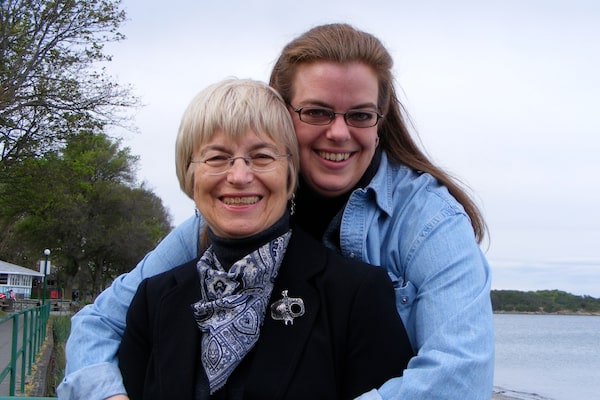
Mary Wilson is shown with her daughter Kira Campbell in 2012, a year before Ms. Wilson was diagnosed with Alzheimer's disease.Handout
The speech pathologist turned to Mary Wilson and gestured toward her husband of 52 years.
“Who’s that?” the pathologist asked.
“Oh, that’s my Bernie,” Ms. Wilson said. “That’s my rock.”
“And do you know who that is?” the pathologist continued, pointing at Kira Campbell, one of Ms. Wilson’s three devoted children.
Yes, Ms. Wilson said, she knew her daughter.
“Do you have any other kids?” the pathologist asked.
Ms. Wilson paused. Over the past four years, Alzheimer’s disease had stripped the 73-year-old of her ability to drive and tell time and read the morning paper, but it had yet not stolen the memory of her children.
“Nope,” Ms. Wilson replied.
It had started. She’d forgotten Kira’s brother and sister.
The descent into dementia is harrowing under any circumstance, but in Ms. Wilson’s case, every lost word or forgotten name was freighted with significance. That summer, in 2017, she was trying to become one of the first patients in Canada – perhaps the first – to be approved for a medically assisted death for Alzheimer’s disease. But every mental slip made it less likely that Ms. Wilson, a petite former civil servant with a grey pixie haircut and three university degrees, would have the mental capacity to give informed consent for a medically assisted death.
Assisted-dying provider Konia Trouton.Chad Hipolito/The Globe and Mail
The situation was equally fraught for the doctors who wanted to help her.
Konia Trouton, a Victoria physician, believed that Ms. Wilson should be eligible to end her life under Canada’s assisted-dying legislation. But she also knew that the law, passed by Justin Trudeau’s Liberal government in 2016, was vague and open to interpretation and, to her knowledge, hadn’t been applied to someone whose only illness was dementia. Some legal experts believed it couldn’t be, for two reasons: patients need the mental capacity to provide consent, and their death needs to be considered “reasonably foreseeable" (although that term is not clearly defined in the legislation). The law seemed clear enough about excluding dementia patients that even the Alzheimer Society of Canada had been telling clients that they could not get an assisted death.
Dr. Trouton knew that helping Ms. Wilson was risky – and could lead to the loss of her medical licence or worse, a criminal sentence.
But she and a team of two other physicians believed their patient met the two contentious requirements: She was grievously ill enough to qualify for an assisted death, but not so far gone she couldn’t consent.
So on Oct. 29, 2017 – at Ms. Wilson’s apartment in Victoria, with her children and Bernie, her rock, beside her – the doctors took a chance and gave her the death she’d been hoping for.
It was a quiet event that didn’t draw attention or make headlines then, but may now have wide-reaching implications for tens of thousands of Canadians in the early stages of dementia.
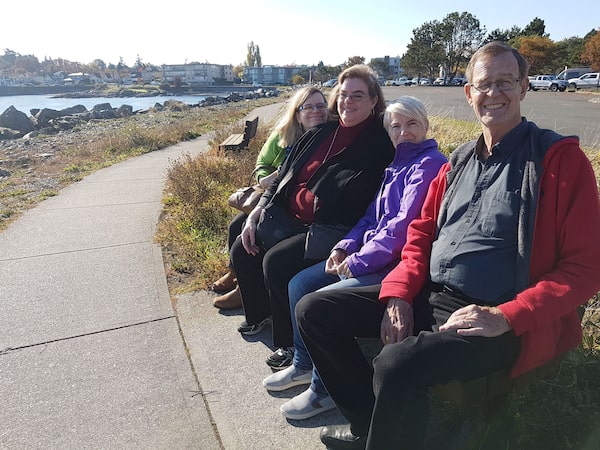
Mary Wilson, Bernie Campbell and their two daughters sit together in Victoria on Oct. 29, 2017, Ms. Wilson's last day of life.Courtesy of family/Courtesy of family
A confidential decision by the College of Physicians and Surgeons of British Columbia, which spent 10 months investigating the death, has cleared the three doctors of wrongdoing.
While the word of one province’s medical regulator is not the same as a judicial precedent, the B.C. College’s position is likely to reassure doctors who fear they might lose their licences if they hasten the deaths of willing and mentally capable dementia patients. “One of the reasons [this decision] is so important is because it gives comfort to clinicians,” said Jocelyn Downie, a professor in the faculties of law and medicine at Dalhousie University. “They can see that, okay, the [B.C.] College thinks this is fine.”
The B.C. decision is equally likely to horrify opponents of medically assisted death, some of whom worry that pro-assisted-death doctors are pushing the boundaries of Canada’s law too far, possibly endangering vulnerable seniors on the knife’s edge of competency.
Either way, Canada is at a political crossroads when it comes to who qualifies for medically assisted dying. Last month, a Quebec judge struck down as unconstitutional parts of the federal assisted-dying law and a related Quebec law that seemed – at least on paper – to limit the procedure to the terminally ill. The subject has now become an election issue: Conservative Leader Andrew Scheer has vowed to appeal the Quebec decision, which could make access to assisted death more difficult for those with dementia. Mr. Trudeau, meanwhile, has said that if re-elected, his government would re-write its own federal law rather than challenge the Quebec ruling – potentially making it easier for those with the condition to access medical assistance in dying, or MAID.
Even before last month’s legal developments, the Canadian Association of MAID Assessors and Providers had already published clinical practice guidelines designed to teach other doctors how to work within the bounds of the existing law to assess dementia patients for MAID.
But all of these developments were a long way off in the summer of 2017, when Mary Wilson forgot, for a fleeting moment, that she had two other children.
Mr. Campbell, middle, spends time at his home with daughter Kira and son Ken Campbell in Canmore, Alta, this past September.Todd Korol/The Globe and Mail
A ‘beautifully tuned mind’
One day in 2011, Ms. Wilson walked into her Victoria apartment, dropped her keys on the kitchen counter and turned to her husband, Bernie Campbell. “You’re in charge of driving from now on,” she said. “I’m a danger on the road because I don’t know where I am.”
Ms. Wilson never deluded herself, not even in the period before her 2013 diagnosis, when denial was still an option. This level of self-awareness is not always common in patients with dementia – a disease that afflicts 564,000 Canadians – but it was typical of Ms. Wilson. She had a “beautifully tuned mind,” her son Ken, now 52, said.
A history buff, Ms. Wilson could rattle off the names and ascension dates of every British monarch back to 1066. She added up long columns of numbers in her head with ease as she tended the family’s books.
“The only thing that I do not want to happen,” Ms. Wilson told her husband when her neurologist confirmed she had Alzheimer’s disease, "is that I do not want to be placed in a home and I do not want to live past the day when I can’t recognize you or the kids or my sister and brother. Period.”
Mr. Campbell began researching ways to help her end her life.
“I was finding out where I could score fentanyl. I was offering to buy a pistol. We were researching Switzerland,” he said, referring to the only country that routinely offers assisted death to foreigners.
The couple watched intently as a unanimous Supreme Court of Canada struck down the Criminal Code ban of the procedure in 2015, and as the Liberal government crafted Bill C-14 to respond to the ruling.
The legislation, enacted on June 17, 2016, did not include a provision for advance requests for assisted dying. If it had, Ms. Wilson could have put her instructions for MAID in writing and asked that they be carried out far in the future, when she was closer to death but no longer mentally capable of making medical decisions.
As the law stood, she feared she wouldn’t qualify. But she wanted to find out for sure. In January of 2017, Ms. Wilson’s family physician referred her to Stefanie Green, a doctor who now leads the Canadian Association of MAID Assessors and Providers.
Dr. Stefanie Green, shown in her office in Victoria in 2017, is now head of the Canadian Association of MAID Assessors and Providers.Chad Hipolito/The Globe and Mail
DEATH, DEMENTIA AND THE LAW
When Mr. Trudeau’s newly elected government was drafting Canada’s assisted-dying law, a provincial-territorial expert group and a joint committee of the House and Senate both recommended that Canada’s new regime permit some form of advance request.
But the Liberal government rejected the idea, siding with disability advocates and others who feared an overly permissive law would endanger the vulnerable, and the final legislation required patients to be capable of providing informed consent right up until the moment of their deaths.
Before that moment, two doctors have to conclude independently that applicants have a “grievous and irremediable” medical condition, which the law defines as a “serious and incurable illness, disease or disability” that causes “enduring physical or psychological suffering that is intolerable” and “an advanced state of irreversible decline in capability.”
Prime Minister Justin Trudeau speaks in Question Period in 2016, the year his government's medically assisted dying law was passed.Adrian Wyld/The Canadian Press
Most controversially, the Liberals inserted a clause that went beyond the language in the landmark Supreme Court ruling.
Patients can only be granted an assisted death if “their natural death has become reasonably foreseeable, taking into account all of their medical circumstances, without a prognosis necessarily having been made as to the specific length of time that they have remaining.”
The “reasonably foreseeable death” concept puzzled doctors. Many took it to mean that only the terminally ill would qualify, which explains why two-thirds of the 6,749 Canadians who had received an assisted death as of last fall had metastatic cancer.
But some physicians felt that approach excluded patients with longer life expectancy who were clearly eligible, a position that gained more traction after an Ontario judge concluded in June of 2017 that A.B., an unnamed 77-year-old woman with severe osteoarthritis whose death was not imminent, met the eligibility criteria.
It was against this evolving and uncertain legal backdrop that Mary Wilson e-mailed Dr. Green with her official application for an assisted death on July 21, 2017.
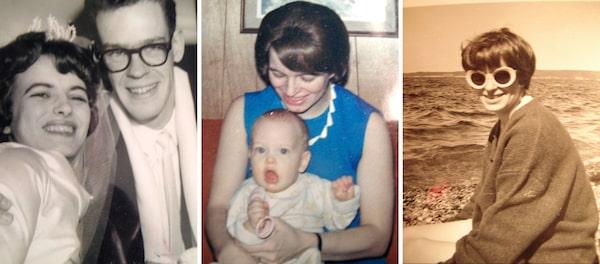
At left, Mary Wilson and Bernie Campbell on their wedding day in 1964; at middle, holding son Ken in Boston, circa 1969; at right, Ms. Wilson on a Florida beach in 1970.Courtesy of family/Courtesy of family
Not long to live
In many ways, Ms. Wilson’s case was an ideal test of whether patients whose only illness was dementia could qualify for MAID.
She was given five-to-seven years to live when diagnosed, meaning that, by 2017, there was a persuasive case to be made that her death was reasonably foreseeable.
In March of that year, her neurologist concluded that she still had the capacity to make medical decisions, despite no longer being able to drive or dress herself without her husband’s help.
And although there was plenty of debate among assisted-dying providers about what counted as “an advanced state of irreversible decline in capability,” Dr. Green felt Ms. Wilson satisfied that test of the law, too.
“What would be more advanced,” she wrote in her notes, “than being close to losing capacity to make decisions for oneself?”
Just as important to Dr. Green, Ms. Wilson had the full-throated support of her husband and three children, including her other daughter, who spoke to The Globe at length but preferred not to be named.
The situation came to a head that July, when Mr. Campbell’s heart troubles landed him in hospital, and Ken flew to Victoria from his home in Canmore, Alta. He was gobsmacked by how swiftly his mother had declined.
“She certainly remembered everyone,” Ken said, “but she had a hell of a time remembering their names.”
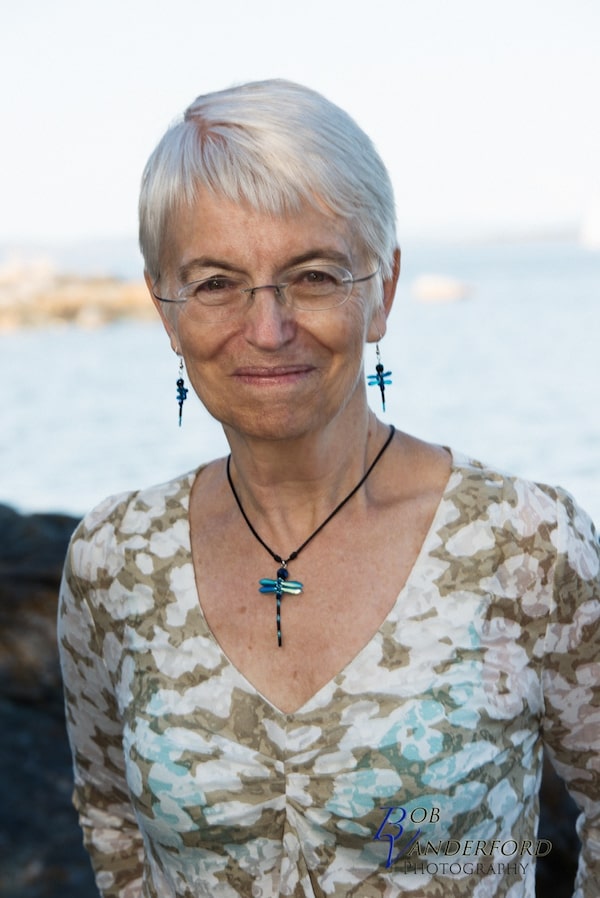
Ms. Wilson in 2014.Handout
In a fresh capacity assessment in August, Ms. Wilson’s neurologist confirmed she was still capable of making health decisions.
Just because a patient cannot remember that a sock goes on before a shoe, does not mean she is incapable of expressing a choice or appreciating the irreversible consequences of MAID – all things a doctor should look for while assessing for capacity in assisted-death cases, according to the clinical practice guideline that the Canadian Association of MAID Assessors and Providers published in May.
In making that assessment, for example, a doctor might make sure a patient who struggles to find words is still able to recognize that their disease severely affects his or her life. The guidelines advise using yes or no questions, so the physician might ask, “Are you able to wash yourself?” as opposed to “How does your illness impact your daily activities?"
Vancouver physician Ellen Wiebe, lead author of the guideline paper, said determining capacity in the moment is easier than predicting when it will evaporate. In the fewer than 15 MAID and dementia cases she has handled (not all of which ended with an assisted death) Dr. Wiebe has followed what some Dutch providers call the “ten-minutes-to-midnight approach” and checks in regularly with patients as their decision-making capacity winds down.
“It’s really hard,” Dr. Wiebe said. “When I tell people it’s now or never, that’s a horrible thing to do. But I only do it in situations where they asked me to do it.”
In Ms. Wilson’s case, she still needed a second official assessor of her eligibility for MAID. For that, she turned to Konia Trouton, an active assisted-dying provider who was no stranger to offering medical care that other doctors might shy away from. (She and her wife, Dawn Fowler, the now-retired Canadian director of the National Abortion Federation, opened the first abortion clinic on Vancouver Island together.)
When Dr. Trouton met her for the first time at her home on Sept. 8, Ms. Wilson was scattered but still able to demonstrate that she understood the nature of her illness. Ms. Wilson, who by then had turned 74, showed Dr. Trouton old journal entries full of neat paragraphs and flowing penmanship, then flipped to a more recent page. “I can’t write properly,” Dr. Trouton recalled her saying. She pointed to the television remote. She couldn’t remember what it was called or how to use it.
“Very clearly she just said, ‘I want to die. I want this to stop,' ” Dr. Trouton recalled.
Similar to Dr. Green, Dr. Trouton felt strongly that Ms. Wilson qualified. But both said their approvals would only be good until the end of October, after which they would insist on reassessing Ms. Wilson to ensure she hadn’t lost capacity.
Dr. Green, shown at her Victoria office, felt strongly that Ms. Wilson qualified for a medically assisted death.Chad Hipolito/The Globe and Mail
Only one obstacle remained: The lawyers.
The Canadian Medical Protective Association, the legal group for doctors that Dr. Green enlisted for advice, declined to comment on Ms. Wilson’s case and the doctor declined to share the written legal opinion she received. But Dr. Green’s notes in Ms. Wilson’s file (shared with Mr. Campbell’s permission) make plain the effect of the advice.
“I have decided that I will not assist Mary in her application for MAID,” Dr. Green wrote on Sept. 22, 2017. “To be clear, I believe she’s eligible and qualifies … I also recognize that several interpretations of the law have not yet been tested in court and that if I am incorrect in my interpretation it carries the risk of prosecution and imprisonment.”
Dr. Green said she felt like a coward. “I wasn’t sure they were going to find someone who was going to help them,” she said.
Mr. Campbell panicked and contacted the only other person he thought might help. “I sent up a little prayer: Please let Konia say yes.”
Up until that point, Dr. Trouton had only been involved in her capacity as an assessor, but now the family was hoping she would be the one to do the procedure. As she weighed her decision, she thought of her father-in-law, reduced by Lewy Body disease, another cause of dementia, to a shell of his old self before his death in 2016. She assessed Ms. Wilson in person twice more, recording both encounters on an iPad so she could review them if need be. She was confident Ms. Wilson qualified.
“If I’m committed to MAID,” she said to herself, “Then I should be committed to doing this case.”
Paul Pereira, a Victoria physician who had cared for the couple for more than a decade, provided the crucial final assessment of Ms. Wilson’s eligibility.
“It’s funny,” Dr. Pereira said. “I had a little bit of anxiety, but I felt pretty good about it. I really felt that Mary was a unique and good case for this.”
On Oct. 29, 2017, the day of her death, Ms. Wilson, Mr. Campbell and their children went out for a last morning coffee and a stroll along the walkway at Turkey Head point. In the afternoon, Ms. Wilson’s sister and brother and their spouses joined them.
When Dr. Trouton arrived, she led Ms. Wilson into her bedroom. The two were alone, except for a volunteer from the advocacy group Dying with Dignity Canada who had come to act as a writing proxy for Ms. Wilson. She could no longer sign her own name.
“What do you think we’re doing today,” Dr. Trouton said, recalling their conversation.
“This is the day I’m going to die,” Ms. Wilson replied.
“Do you want to go ahead with your assisted dying today?”
“Yes, absolutely.”
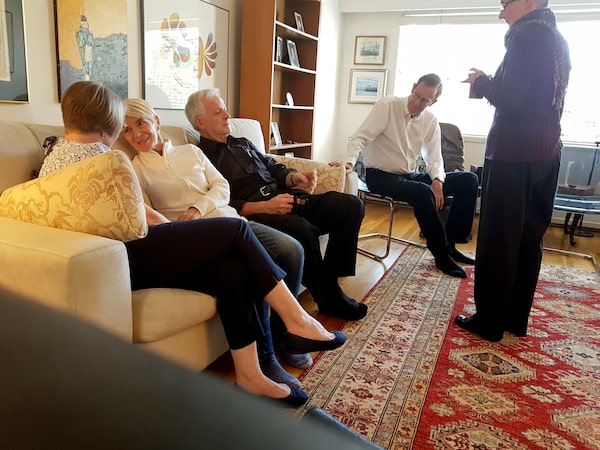
Victoria, 2017: Mary Wilson, second from left, sits in her apartment on her Oct. 29 'last day party.' With her, from left, are her sister Jane Wilson; brother Peter Wilson; husband Bernie Campbell; and sister-in-law Dianne Wilson, Peter's wife.Courtesy of family
Canmore, 2019: The sofa that Ms. Wilson died on in Victoria has since been moved to the Alberta town that Mr. Campbell, pictured, and his son Ken now call home.Todd Korol/The Globe and Mail
The final prognosis
Dr. Trouton was not surprised when a butter-coloured envelope from the College of Physicians and Surgeons of British Columbia landed at her office on Feb. 5, 2018, announcing that she, Dr. Pereira and the neurologist (whom The Globe was unable to reach) were under investigation for their role in Ms. Wilson’s death.
She figured it was only a matter of time before the B.C. Coroners Service – which reviewed all MAID deaths in the province until last fall, when Health Canada adopted a national monitoring system – sent Ms. Wilson’s case to the regulator for a deeper look at whether her Alzheimer’s disease satisfied every requirement of the “grievous and irremediable” test.
Ten months later, the College concluded that the doctor and her two colleagues had gotten it right. Their conduct had been, “consistent with the current legislation [and] relevant College standards," and they had taken a, "thoughtful and conscientious approach to this unique clinical scenario.”
Dr. Green, who has since gone on to provide assisted death in a dementia case, called the decision, “groundbreaking.”
Heidi Oetter, the registrar of the B.C. College was much more circumspect. She stressed that interpreting the Criminal Code is the job of the courts, not medical regulators; their decisions are not precedents.
The B.C. College never released the results of the investigation into Mary Wilson’s death, Dr. Oetter explained, because it did not lead to a formal disciplinary hearing. That’s the only circumstance under which the College is allowed by law to publicly acknowledge the existence of an inquiry.
As long as that privacy rule stands, patients, the broader medical community and those who worry that Canada’s assisted-dying program may have gone too far all have little way of knowing just how far it has already gone.
“I’m not romanticizing Alzheimer’s. I’m aware of the devastating nature of the disease,” said Trudo Lemmens, a professor of law and bioethics at the University of Toronto.
“At the same time, I find it worrisome that we try to focus on ending the life of people with Alzheimer’s, rather than improving quality of life [and] reducing the suffering of people undergoing cognitive decline.”
On the other side of that debate are eligible Canadians with dementia who would prefer to die with the help of doctor – some of whom may have lost the capacity to make that choice in the nearly two years since Ms. Wilson emerged from her bedroom to say a final goodbye to the people she loved most.
“Three times I could tell she really wanted to say something to people, you know? Just some touching way of saying goodbye," her son Ken said. “She was able to chat with people one on one, but when everyone was looking at her, she had no script.
"I think the third time she just felt like anything she could say was inadequate. She just shrugged and looked around went, ‘Oh well, I just can’t find words. Goodbye.’ And smiled. And looked at the doctor, and said, ‘I’m ready.’ ”
Watch: Memories of Mary Wilson’s last day
"At about 4 o'clock, Mary turned to me, put her head on my shoulder, and she said softly, "I'm ready." Listen to Bernie Campbell describe how Mary Wiilson made her final goodbyes in 2017.
 Kelly Grant
Kelly Grant